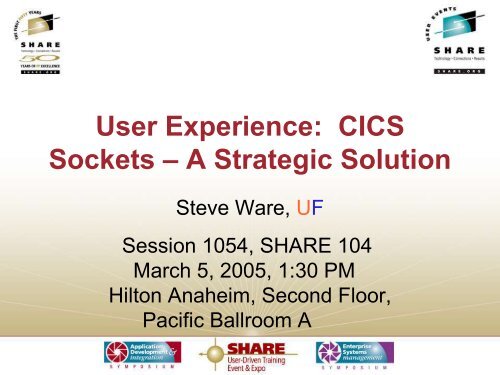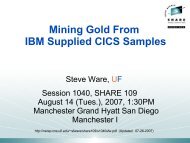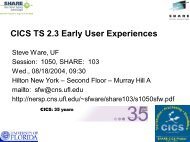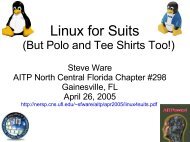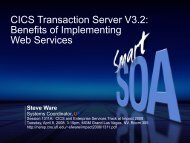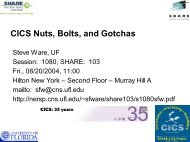User Experience: CICS Sockets - A Strategic ... - University of Florida
User Experience: CICS Sockets - A Strategic ... - University of Florida
User Experience: CICS Sockets - A Strategic ... - University of Florida
You also want an ePaper? Increase the reach of your titles
YUMPU automatically turns print PDFs into web optimized ePapers that Google loves.
<strong>User</strong> <strong>Experience</strong>: <strong>CICS</strong><br />
<strong>Sockets</strong> – A <strong>Strategic</strong> Solution<br />
Steve Ware, UF<br />
Session 1054, SHARE 104<br />
March 5, 2005, 1:30 PM<br />
Hilton Anaheim, Second Floor,<br />
Pacific Ballroom A
Abstract<br />
The <strong>University</strong> <strong>of</strong> <strong>Florida</strong> has considered the <strong>CICS</strong> Socket<br />
Interface a strategic part <strong>of</strong> their enterprise IT solutions suite<br />
for many years. Now that even IBM has deemed the <strong>CICS</strong><br />
Socket Interface a strategic <strong>CICS</strong> connectivity option (as<br />
noted in the June 2004 <strong>CICS</strong> solutions White paper,<br />
G224-7324 “Delivering e-business access to <strong>CICS</strong>: <strong>Strategic</strong><br />
Options”), it's time to once again take a closer look at the<br />
past, present, and future <strong>of</strong> this very capable component <strong>of</strong><br />
Communications Server for z/OS.<br />
mailto:sfw@cns.ufl.edu<br />
http://nersp.cns.ufl.edu/~sfware/share104/s1054sw.pdf<br />
© Copyright Steve Ware, 2005. All Rights Reserved.<br />
2
Disclaimer<br />
Standard disclaimers apply. Any opinions expressed are<br />
the opinion <strong>of</strong> the author only. Any mentioned brand names,<br />
trademarks, registered trademarks, service marks, etc.,<br />
are the exclusive property <strong>of</strong> their owners. No warranties are<br />
either expressed or implied, your mileage may vary, etc.<br />
© Copyright Steve Ware, 2005. All Rights Reserved.<br />
3
Agenda/Topics<br />
• Introduction<br />
• Past/Present/Future Overview<br />
• <strong>Strategic</strong> Considerations<br />
• Applications<br />
• Security Considerations<br />
• <strong>CICS</strong> Regions Consolidation<br />
• Miscellaneous Considerations<br />
• Summary and Q&A<br />
• Appendix and Additional Information<br />
© Copyright Steve Ware, 2005. All Rights Reserved.<br />
4
Introduction<br />
• UF CNS, <strong>University</strong> <strong>of</strong> <strong>Florida</strong> Computing & Networking<br />
Services (formerly known as NERDC), is the primary data<br />
center at the Gainesville, FL campus.<br />
• Currently utilizing an IBM zSeries z800 2066-002 with<br />
16GB, running z/OS 1.4, <strong>CICS</strong> TS 2.3, DB2 7.1, RACF,<br />
JES2, etc.<br />
• 3 LPARs - 1 internal "sysprog sandbox", 1 test "alternate",<br />
and 1 production or "primary".<br />
• We have 12 <strong>CICS</strong> regions configured, and run ~1M prod.<br />
transactions/weekday, and ~2M on peak load days.<br />
• 2 internal sandbox, 2 development, 3 test, and 5<br />
production <strong>CICS</strong> regions currently configured.<br />
© Copyright Steve Ware, 2005. All Rights Reserved.<br />
5
Introduction<br />
• Founded in 1853, became the <strong>University</strong> <strong>of</strong> <strong>Florida</strong> in<br />
1905. (East <strong>Florida</strong> Seminary -> <strong>Florida</strong> Agricultural<br />
College -> <strong>University</strong> <strong>of</strong> <strong>Florida</strong>)<br />
• UF is a member <strong>of</strong> the AAU, the Association <strong>of</strong> American<br />
Universities.<br />
• UF is one <strong>of</strong> the five largest universities in the U.S., public<br />
or private.<br />
• Over 48K enrolled at the start <strong>of</strong> Fall 2004 semester, and<br />
over 250K alumni.<br />
© Copyright Steve Ware, 2005. All Rights Reserved.<br />
6
Introduction<br />
• We're considered a "Classic" <strong>CICS</strong> site.<br />
("Legacy = It Works!")<br />
• Web access to <strong>CICS</strong> is via the <strong>CICS</strong> Socket Interface, in<br />
use at our site since ~1997.<br />
• More than ~60% <strong>of</strong> local <strong>CICS</strong> tasks utilize sockets.<br />
• All locally developed <strong>CICS</strong> applications are Assembler<br />
and/or COBOL. We have ~8K <strong>CICS</strong> application load<br />
modules, and ~32 have <strong>CICS</strong> sockets API.<br />
• Several internal <strong>CICS</strong> application programs written in<br />
C/C++ and REXX. Java has only been IVP tested.<br />
•<br />
© Copyright Steve Ware, 2005. All Rights Reserved.<br />
7
Introduction<br />
• Separation <strong>of</strong> business, data access, and presentation<br />
logic is very important to easily web-enable <strong>CICS</strong><br />
applications.<br />
• More recently, IBM (and others) have also recommended<br />
that interface logic, or component interfaces, be<br />
separated, to make it easier to integrate <strong>CICS</strong><br />
applications with other disparate systems.<br />
• <strong>CICS</strong> has many connectivity options, but the <strong>CICS</strong><br />
Socket Interface allows connectivity to almost any<br />
system that supports TCP/IP, which is about every known<br />
computing system today.<br />
© Copyright Steve Ware, 2005. All Rights Reserved.<br />
8
Introduction<br />
• This presentation is focused on the <strong>CICS</strong> Socket<br />
Interface (CSI) component <strong>of</strong> IBM Communications<br />
Server for z/OS, not the <strong>Sockets</strong> Domain component <strong>of</strong><br />
<strong>CICS</strong> TS for z/OS.<br />
• See the presentation Appendix for links to prior SHARE<br />
presentations, IBM documentation, IBM presentations,<br />
etc., that include more overview, implementation, and<br />
configuration detail.<br />
• Recall that IBM TCP/IP z/OS development is in Raleigh,<br />
NC, and IBM <strong>CICS</strong> development is in Hursley, UK.<br />
© Copyright Steve Ware, 2005. All Rights Reserved.<br />
9
Past/Present/Future Overview<br />
• RFC 33 - New Host-Host Protocol, 12 February 1973.<br />
• "A socket forms one end <strong>of</strong> a connection, and a<br />
connection is fully specified by a pair or sockets."<br />
• RFC 33, Figure 4, The relationship between sockets<br />
and processes:<br />
© Copyright Steve Ware, 2005. All Rights Reserved.<br />
| |<br />
++ ++<br />
| | link | |<br />
| process |(||)| process |<br />
| | ^ ^ | |<br />
++ | | ++<br />
| |<br />
send socket receive socket<br />
10
Past/Present/Future Overview<br />
• Note: See the appropriate Appendix section <strong>of</strong> the IBM<br />
<strong>CICS</strong> Socket Interface Guide and Reference Manual<br />
"Related protocol specifications (RFCs)", which lists the<br />
related RFCs for TCP/IP.<br />
• "The Internet Protocol suite is still evolving through requests<br />
for comments (RFC). New protocols are being designed and<br />
implemented by researchers and are brought to the attention<br />
<strong>of</strong> the Internet community in the form <strong>of</strong> RFCs. Some <strong>of</strong> these<br />
protocols are so useful that they become recommended<br />
protocols. That is, all future implementations for TCP/IP are<br />
recommended to implement these particular functions or<br />
protocols. These become the de facto standards, on which the<br />
TCP/IP protocol suite is built."<br />
© Copyright Steve Ware, 2005. All Rights Reserved.<br />
11
Past/Present/Future Overview<br />
• <strong>CICS</strong> Socket Interface optional feature added to TCP/IP<br />
for MVS in 1992, and was additional cost at the time.<br />
• Due to budget considerations, initial requests to purchase<br />
this optional/added cost feature were turned down by<br />
data center management.<br />
• IBM eventually bundled the <strong>CICS</strong> Socket Interface "no<br />
additional cost" feature into OS/390 1.x.<br />
• After we installed OS/390 1.3, in about 1997, we started<br />
taking a look at IBM TCP/IP 3.2 for MVS with<br />
"Enhancements Kit", FMID JTCP32C, aka "Release<br />
32C".<br />
© Copyright Steve Ware, 2005. All Rights Reserved.<br />
12
Past/Present/Future Overview<br />
• Initially, the <strong>CICS</strong> Socket Interface required at least<br />
<strong>CICS</strong>/ESA 3.3 - we had <strong>CICS</strong>/ESA 4.1. Note that there<br />
were some limitations if you only had <strong>CICS</strong>/ESA 3.3.<br />
• Note that during this time frame, Interlink Computer<br />
Sciences, Inc., had a competing MVS IP stack, with a<br />
<strong>CICS</strong> socket interface and included development tools.<br />
• Then as now, the primary reference manual is the IBM<br />
"<strong>CICS</strong> <strong>Sockets</strong> Guide (and Reference)", in the "IBM<br />
Communications Server" bookshelf. In z/OS 1.4, it is<br />
currently titled "z/OS V1R4.0 CS: IP <strong>CICS</strong> <strong>Sockets</strong><br />
Guide", and has document number SC31-8807-##.<br />
© Copyright Steve Ware, 2005. All Rights Reserved.<br />
13
Past/Present/Future Overview<br />
• Socket applications are peer-to-peer with both ends<br />
programmable. "P2P" has been in the news recently.<br />
• The CSI is bi-directional (inbound and outbound socket<br />
calls), and a "low-level" interface.<br />
• Provides a comprehensive socket API (Application<br />
Programming Interface).<br />
• IBM says: "The advantage <strong>of</strong> using the socket API<br />
directly is the opportunity for developing high-performing<br />
applications with a very low s<strong>of</strong>tware overhead."<br />
© Copyright Steve Ware, 2005. All Rights Reserved.<br />
14
Past/Present/Future Overview<br />
• CSI is implemented in <strong>CICS</strong> as a TRUE (Task Related<br />
<strong>User</strong> Exit) similarly to DB2.<br />
• Provides reusable MVS TCBs, listener(s), a security<br />
exit point, etc.<br />
• <strong>Strategic</strong>? Yes!<br />
© Copyright Steve Ware, 2005. All Rights Reserved.<br />
Figure 1. The use <strong>of</strong> <strong>CICS</strong> <strong>Sockets</strong>, from SC31-8807.<br />
15
Past/Present/Future Overview<br />
© Copyright Steve Ware, 2005. All Rights Reserved.<br />
Figure 3., "A<br />
typical client<br />
server session",<br />
from the IBM<br />
<strong>CICS</strong> Socket<br />
Interface manual<br />
for z/OS 1.4.<br />
16
Past/Present/Future Overview<br />
• "An iterative server handles both the connection request and the<br />
transaction involved in the call itself. Iterative servers are fairly<br />
simple and are suitable for transactions that do not last long."<br />
• "However, if the transaction takes more time, queues can build up<br />
quickly. In Figure 4, once Client A starts a transaction with the<br />
server, Client B cannot make a call until A has finished."<br />
© Copyright Steve Ware, 2005. All Rights Reserved.<br />
Figure 4. An iterative server, from SC31-8807.<br />
17
Past/Present/Future Overview<br />
• "So, for lengthy transactions, a different sort <strong>of</strong> server is needed -- the<br />
concurrent server, as shown in Figure 5. Here, Client A has already<br />
established a connection with the server, which has then created a child<br />
server process to handle the transaction. This allows the server to process<br />
Client B's request without waiting for A's transaction to complete. More than<br />
one child server can be started in this way."<br />
• "TCP/IP provides a concurrent server program called the <strong>CICS</strong> Listener."<br />
© Copyright Steve Ware, 2005. All Rights Reserved.<br />
Figure 5. A concurrent server, from SC31-8807.<br />
18
Past/Present/Future Overview<br />
© Copyright Steve Ware, 2005. All Rights Reserved.<br />
19
Past/Present/Future Overview<br />
• The socket API is available in the C language and in<br />
COBOL, PL/I, or assembler language. It includes the<br />
following socket calls:<br />
• Basic calls: SOCKET, BIND, CONNECT, LISTEN, ACCEPT,<br />
SHUTDOWN, CLOSE<br />
• Read/Write calls: SEND, SENDTO, RECVFROM, READ, WRITE<br />
• Advanced calls: GETHOSTNAME, GETPEERNAME,<br />
GETSOCKNAME, GETSOCKOPT, IOCTL, SELECT,<br />
GETHOSTBYNAME, GETHOSTBYADDR<br />
• IBM-specific calls: INITAPI, GETCLIENTID, GIVESOCKET,<br />
TAKESOCKET<br />
© Copyright Steve Ware, 2005. All Rights Reserved.<br />
20
Past/Present/Future Overview<br />
• The CSI supported API commands for sockets<br />
programming (as <strong>of</strong> z/OS 1.4):<br />
ACCEPT, BIND, CLOSE, CONNECT, FCNTL,<br />
GETCLIENTID, GETHOSTBYADDR, GETHOSTBYNAME,<br />
GETHOSTID, GETHOSTNAME, GETPEERNAME,<br />
GETSOCKNAME, GETSOCKOPT, GIVESOCKET, INITAPI<br />
and INITAPIX, IOCTL, LISTEN, READ, READV, RECV,<br />
RECVFROM, RECVMSG, SELECT, SELECTEX, SEND,<br />
SENDMSG, SENDTO, SETSOCKOPT, SHUTDOWN ,<br />
SOCKET, TAKESOCKET, TERMAPI, WRITE, WRITEV<br />
© Copyright Steve Ware, 2005. All Rights Reserved.<br />
21
Past/Present/Future Overview<br />
| WORKINGSTORAGE SECTION. |<br />
| 01 SOCFUNCTION PIC X(16) VALUE IS 'SELECT'. |<br />
| 01 MAXSOC PIC 9(8) BINARY VALUE 50. |<br />
| 01 TIMEOUT. |<br />
| 03 TIMEOUTSECONDS PIC 9(8) BINARY. |<br />
| 03 TIMEOUTMILLISEC PIC 9(8) BINARY. |<br />
| 01 RSNDMASK PIC X(50). |<br />
| 01 WSNDMASK PIC X(50). |<br />
| 01 ESNDMASK PIC X(50). |<br />
| 01 RRETMASK PIC X(50). |<br />
| 01 WRETMASK PIC X(50). |<br />
| 01 ERETMASK PIC X(50). |<br />
| 01 ERRNO PIC 9(8) BINARY. |<br />
| 01 RETCODE PIC S9(8) BINARY. |<br />
| |<br />
| PROCEDURE DIVISION. |<br />
| CALL 'EZASOKET' USING SOCFUNCTION MAXSOC TIMEOUT |<br />
| RSNDMASK WSNDMASK ESNDMASK |<br />
| RRETMASK WRETMASK ERETMASK |<br />
| ERRNO RETCODE. |<br />
| |<br />
|________________________________________________________________________|<br />
Figure 6. The SELECT call<br />
© Copyright Steve Ware, 2005. All Rights Reserved.<br />
22
Past/Present/Future Overview<br />
• The CSI supported API functions for C sockets<br />
programming (as <strong>of</strong> z/OS 1.4):<br />
accept(), bind(), close(), connect(), fcntl(), getclientid(),<br />
gethostbyaddr(), gethostbyname(), gethostid(), gethostname(),<br />
getpeername(), getsockname(), getsockopt(), givesocket(),<br />
initapi(), ioctl(), listen(), read(), recv(), recvfrom(), select(),<br />
send(), sendto(), setsockopt(), shutdown(), socket(), takesocket(),<br />
write()<br />
© Copyright Steve Ware, 2005. All Rights Reserved.<br />
23
Past/Present/Future Overview<br />
#include (non-reentrant programs only)<br />
#include (reentrant programs only)<br />
#include <br />
#include <br />
#include <br />
int accept(int s, struct sockaddr *name, int *namelen)<br />
© Copyright Steve Ware, 2005. All Rights Reserved.<br />
24
Past/Present/Future Overview<br />
• Critical to our success was the September 1993 IBM<br />
Redbook, "<strong>CICS</strong>/ESA and TCP/IP for MVS <strong>Sockets</strong><br />
Interface", GG24-4026, which included a diskette with<br />
sample application code. One <strong>of</strong> the reviewers/editors<br />
<strong>of</strong> this Redbook was Bob Yelavich, from the Dallas<br />
Systems Center (at the time). Note that the IBM Redbook<br />
web site says the publish date is 04 October 1993.<br />
• The IBM GG24-4026 Redbook is still available in PDF<br />
and HTML formats at http://www.redbooks.ibm.com/.<br />
(Search for gg244026.) The downloads at<br />
ftp://www.redbooks.ibm.com/redbooks does not currently<br />
have the diskette material from this Redbook.<br />
© Copyright Steve Ware, 2005. All Rights Reserved.<br />
25
Past/Present/Future Overview<br />
• Standard and enhanced listener. We utilize the<br />
standard listener, and it has met all <strong>of</strong> our varied needs,<br />
from both a system and application perspective.<br />
• Support for IPv4 (32-bit addresses) and IPv6/IPng (128bit<br />
addresses) in standard and enhanced listener, along<br />
with multicast options, starting with z/OS 1.5.<br />
• The IBM Listener program, EZACIC02, allows for WLM<br />
registration and deregistration in support <strong>of</strong> connection<br />
balancing.<br />
© Copyright Steve Ware, 2005. All Rights Reserved.<br />
26
Past/Present/Future Overview<br />
• IBM has said that the focus with the <strong>CICS</strong> Socket<br />
Interface in z/OS 1.6 is "reliability". Note that we have<br />
not had a z/OS 1.4 TCP/IP stack nor a <strong>CICS</strong> Socket<br />
Interface unscheduled outage in several years. zSeries<br />
z800, z/OS 1.4, <strong>CICS</strong> TS 2.3, and the <strong>CICS</strong> Socket<br />
Interface have been very reliable at our site.<br />
• Almost all "issues" with local <strong>CICS</strong> Socket Interface<br />
availability or performance have been related to "external"<br />
components, such as network hardware/s<strong>of</strong>tware, AIX<br />
Apache WebSphere plugin "problems", AIX DB2<br />
Kerberos authentication "hangs", or <strong>CICS</strong> "internal"<br />
issues with various application "opportunities".<br />
© Copyright Steve Ware, 2005. All Rights Reserved.<br />
27
Past/Present/Future Overview<br />
• The <strong>CICS</strong> Socket Interface enhanced listener, also<br />
known as "the enhanced version <strong>of</strong> the <strong>CICS</strong> listener",<br />
does not expect the standard "header" information from<br />
the client, such as <strong>CICS</strong> transid. IBM recognized that<br />
many sites were writing their own listeners, due to a<br />
desire to not have to have clients send this header info.<br />
• "Note: For the enhanced listener, more temporary<br />
storage is needed to support passing a larger amount <strong>of</strong><br />
data to the security/transaction exit and to the child<br />
server. Depending upon the size <strong>of</strong> the data defined in the<br />
Listener configuration, temporary storage should be<br />
adjusted accordingly."<br />
© Copyright Steve Ware, 2005. All Rights Reserved.<br />
28
Past/Present/Future Overview<br />
• EXEC TCP calls <strong>CICS</strong> command API available in TCP/IP<br />
for VSE from CSI International:<br />
http://www.e-vse.com/<br />
• What does the future hold for <strong>CICS</strong> TS for z/OS and the<br />
<strong>CICS</strong> Socket Interface?<br />
© Copyright Steve Ware, 2005. All Rights Reserved.<br />
29
Past/Present/Future Overview<br />
• Allow users to suppress <strong>CICS</strong> Tracing. Reference IBM<br />
REQ00076494 from early 2000. (IMASPZAP?)<br />
• Dynamically disable <strong>CICS</strong> Monitor calls when not coded<br />
in the MCT.<br />
• Looking at having the IP <strong>CICS</strong> <strong>Sockets</strong> task-related user<br />
exit reside in ECDSA.<br />
• Allow IP <strong>CICS</strong> <strong>Sockets</strong> to exploit <strong>CICS</strong> OTE.<br />
• Allow IP <strong>CICS</strong> <strong>Sockets</strong> to exploit SSL/TLS.<br />
• Allow the Listener to restart if/when the stack is recycled.<br />
(see Appendix for a possible solution today).<br />
© Copyright Steve Ware, 2005. All Rights Reserved.<br />
30
<strong>Strategic</strong> Considerations<br />
• "<strong>Strategic</strong>", adj., according to http://www.dictionary.com/:<br />
1. Of or relating to strategy.<br />
2. a. Important or essential in relation to a plan <strong>of</strong> action:<br />
a strategic withdrawal.<br />
b. Essential to the effective conduct <strong>of</strong> war:<br />
strategic materials.<br />
c. Highly important to an intended objective:<br />
The staff discussed strategic marketing factors.<br />
3. Intended to destroy the military potential <strong>of</strong> an enemy:<br />
strategic bombing.<br />
© Copyright Steve Ware, 2005. All Rights Reserved.<br />
31
<strong>Strategic</strong> Considerations<br />
• Almost 10 years ago, to keep the mainframe strategic, we<br />
needed to quickly web-enable <strong>CICS</strong> applications.<br />
• Solution must be very fast, reliable, secure,<br />
inexpensive, etc.<br />
• Exploit the many strengths <strong>of</strong> IBM zSeries hardware,<br />
z/OS, Communications Server for z/OS (TCP/IP for<br />
MVS), <strong>CICS</strong>, and the <strong>CICS</strong> Socket Interface.<br />
• Leverage existing <strong>CICS</strong> applications, and exploit the CSI<br />
to build new/enhanced applications.<br />
© Copyright Steve Ware, 2005. All Rights Reserved.<br />
32
<strong>Strategic</strong> Considerations<br />
• Continue to provide sub-second response time<br />
applications, even from the web.<br />
• Continue to provide very reliable applications, even from<br />
the web.<br />
• Provide viable alternative to other campus presentation<br />
bullet points which tout "eliminate expensive mainframe<br />
technologies".<br />
© Copyright Steve Ware, 2005. All Rights Reserved.<br />
33
<strong>Strategic</strong> Considerations<br />
• Based upon "Open Standards".<br />
• Low-level interface.<br />
• Good performance and WLM enabled.<br />
• Very few limitations.<br />
• Knowledge base wide and large.<br />
• Sample code and applications available.<br />
• Security? See "Security Considerations" section.<br />
© Copyright Steve Ware, 2005. All Rights Reserved.<br />
34
Applications<br />
• Data/file transfer to/from <strong>CICS</strong>.<br />
• CGI/Web access to <strong>CICS</strong>.<br />
• Credit card payments.<br />
• Email from <strong>CICS</strong>.<br />
• DNS lookup.<br />
• Web client and/or server? FTP client and/or server?<br />
• Limited to your imagination!<br />
© Copyright Steve Ware, 2005. All Rights Reserved.<br />
35
Applications - Data/file transfer to/from<br />
<strong>CICS</strong><br />
• First "pro<strong>of</strong> <strong>of</strong> concept" <strong>CICS</strong> Socket Interface<br />
application at our site, and first to be installed in<br />
production <strong>CICS</strong>.<br />
• Worked with <strong>CICS</strong> application developers at FCLA, the<br />
<strong>Florida</strong> Center for Library Automation.<br />
• IND$FILE "replacement".<br />
• Desire to own and maintain the application source<br />
code, due to IND$FILE "issues".<br />
• Visual Basic client program, and <strong>CICS</strong> assembler child<br />
server program.<br />
© Copyright Steve Ware, 2005. All Rights Reserved.<br />
36
Applications - Data/file transfer to/from<br />
<strong>CICS</strong><br />
• UF Registrar "Grade-A-Gator" utilizes HTML form text<br />
upload.<br />
• AIX "C" client CGI program, called "uploader", and <strong>CICS</strong><br />
Assembler child server program.<br />
• Locally written <strong>CICS</strong> Socket Interface security exit,<br />
EZA<strong>CICS</strong>E, coded to verify RACF userids/passwords.<br />
(The presentation Appendix has a link to a skeleton<br />
sample, ezacicse.asm.)<br />
• UF <strong>CICS</strong> Socket Interface applications can also verify<br />
"GatorLink" ids via DB2 stored procedures. (GatorLink<br />
ids are Kerberos based.)<br />
© Copyright Steve Ware, 2005. All Rights Reserved.<br />
37
Applications - CGI/Web access to <strong>CICS</strong><br />
• <strong>CICS</strong> Socket Interface web based check utility was<br />
written to verify availability <strong>of</strong> the interface.<br />
• Useful for system and application programmers, and<br />
operations staff.<br />
• CGI client code written in Perl (called sokt.pl), and <strong>CICS</strong><br />
child server code written in IBM Assembler (called<br />
DCSOKT00). CGI code runs in AIX, but is developed<br />
and tested in Linux.<br />
• See Appendix for links to sokt.pl, dcsokt00.asm, etc.<br />
© Copyright Steve Ware, 2005. All Rights Reserved.<br />
38
Applications - CGI/Web access to <strong>CICS</strong><br />
• UF ISIS - UF Integrated Student Information System.<br />
Register for classes, get grades, check financial aid, do<br />
degree shopping, and much more.<br />
• CGI code written in ANSI C (called "nirvana"), and <strong>CICS</strong><br />
code written in IBM Assembler. CGI code runs in AIX via<br />
Apache web server(s).<br />
• EAGLE - Enhanced Application Generation Language for<br />
the Enterprise.<br />
• See Appendix for links to ISIS and EAGLE web sites.<br />
• Why is the CGI source code called "nirvana"?<br />
© Copyright Steve Ware, 2005. All Rights Reserved.<br />
39
Applications - CGI/Web access to <strong>CICS</strong><br />
• FCLA WebLUIS - Web Library <strong>User</strong> Information System.<br />
Acess to all State <strong>of</strong> <strong>Florida</strong> university library catalogs and<br />
databases.<br />
• LU6.2 to <strong>CICS</strong> Socket Interface application<br />
"conversion". (LU6.2 no longer in use at our site.)<br />
• CGI code written in C, and <strong>CICS</strong> code written in IBM<br />
Assembler. CGI code runs in AIX via Apache web<br />
server(s).<br />
• WebLUIS is being replaced with (non-<strong>CICS</strong>) "Ex Libris<br />
Aleph 500 library management system and Web<br />
Catalog", which is AIX (COBOL) based.<br />
© Copyright Steve Ware, 2005. All Rights Reserved.<br />
40
Applications - CGI/Web access to <strong>CICS</strong><br />
• UNF Osprey Online - <strong>University</strong> <strong>of</strong> North <strong>Florida</strong> (in<br />
Jacksonville, FL) students can register for classes, get<br />
grades, check financial aid, do degree shopping, and<br />
much more.<br />
• UNF Administrative Web Applications - UNF Faculty<br />
and Staff can perform administrative work.<br />
• CGI code written in C, and <strong>CICS</strong> code written in IBM<br />
COBOL. CGI code runs in NT via IIS web server(s).<br />
• UNF is migrating to "UNF Wings", an SCT Banner (non-<br />
<strong>CICS</strong>) ERP solution (utilizing Sun Solaris OS and Oracle<br />
DB - Sun Solaris 10 to be open source, btw).<br />
© Copyright Steve Ware, 2005. All Rights Reserved.<br />
41
Applications - Credit Card Payments<br />
• Students can pay fees via credit card from <strong>CICS</strong>, utilizing<br />
local "IPAY" (NT) system, which connects to ICVERIFY<br />
system(s).<br />
• <strong>CICS</strong> client code for this application is written in IBM<br />
COBOL. C/C++ and Java are utilized on the NT system,<br />
running as socket servers for this <strong>CICS</strong> client.<br />
© Copyright Steve Ware, 2005. All Rights Reserved.<br />
42
Applications - Email from <strong>CICS</strong><br />
• IBM <strong>CICS</strong> SupportPac CA1H, "<strong>CICS</strong> to SMTP Samples":<br />
http://www-306.ibm.com/s<strong>of</strong>tware/htp/cics/support/supportpacs/individual/ca1h.html<br />
• "This SupportPac provides sample programs that show<br />
methods <strong>of</strong> interfacing a <strong>CICS</strong> application with SMTP. The<br />
programs are intended to demonstrate various methods <strong>of</strong><br />
sending EMail from within a <strong>CICS</strong> application. This is<br />
accomplished by utilizing either the <strong>CICS</strong> SPOOL interface or<br />
the <strong>CICS</strong> TCPIP <strong>Sockets</strong> interface. The SPOOL Interface<br />
requires the use <strong>of</strong> the OS/390 SMTP server. The <strong>Sockets</strong><br />
Interface may utilize any SMTP server accessible on the<br />
TCPIP network. There is also an example <strong>CICS</strong> based mail<br />
server that could be used for receiving EMail in <strong>CICS</strong>.<br />
Examples are provided in Assembler, COBOL and C/370."<br />
© Copyright Steve Ware, 2005. All Rights Reserved.<br />
43
Applications - DNS Lookup<br />
• Local DNS testing/verification COBOL program,<br />
DCSO2500:<br />
http://nersp.cns.ufl.edu/~sfware/share97/dcso2500.cob<br />
• This program utilizes a LINK to IBM supplied program<br />
EZACIC25. This is similar to the "nslookup" command<br />
found on many platforms. Here's an example <strong>of</strong> what this<br />
program does from a clear screen in <strong>CICS</strong> (3270-based):<br />
so25 www.ufl.edu (results in)<br />
SO25 WWW.UFL.EDU = 128.227.74.67<br />
© Copyright Steve Ware, 2005. All Rights Reserved.<br />
44
Security Considerations<br />
• <strong>CICS</strong> Socket Interface security exit point is available for<br />
local customization. Default name is EZA<strong>CICS</strong>E, but this<br />
can be modified. See Appendix for a sample EZA<strong>CICS</strong>E.<br />
IBM has said that "a future release <strong>of</strong> z/OS will include a<br />
sample security exit".<br />
• z/OS 1.5 includes DSECT EZA<strong>CICS</strong>X, in OS dataset<br />
prefix.SEZACMAC. This DSECT maps the <strong>CICS</strong> Socket<br />
Interface COMMAREA. (Roll your own if not z/OS 1.5+.)<br />
• Through at least z/OS 1.6, the <strong>CICS</strong> Socket Interface<br />
does not have support for SSL/TLS. IBM has said that<br />
"this support will be included in a future release <strong>of</strong> z/OS".<br />
© Copyright Steve Ware, 2005. All Rights Reserved.<br />
45
Security Considerations<br />
• Until SSL/TLS is available in the <strong>CICS</strong> Socket Interface,<br />
you could "roll your own" encode/decode<br />
(encrypt/decrypt) solution, utilizing the security exit point.<br />
• Another option might by an encrypted VLAN (Virtual<br />
Local Area Network) solution.<br />
• For web access, we utilize SSL enabled web servers for<br />
CGI access on an internal intranet. Clients must utilize<br />
SSL enabled web browsers.<br />
• If complete "end-to-end" SSL is required today, consider<br />
the existing <strong>CICS</strong> Web Support and SOAP for <strong>CICS</strong><br />
capabilities.<br />
© Copyright Steve Ware, 2005. All Rights Reserved.<br />
46
<strong>CICS</strong> Regions Consolidation<br />
• Our site recently consolidated <strong>CICS</strong> regions, for a<br />
variety <strong>of</strong> reasons. We reduced our total configured<br />
regions by 2 - 2 test regions were combined into 1, and 2<br />
production regions were combined into 1.<br />
• MRO/Function Shipping CPU consumption reduction<br />
considerations.<br />
• Changes in workload and application mix.<br />
• Now using 2 listeners in several <strong>CICS</strong> regions.<br />
• Reguired minor modifications to the <strong>CICS</strong> Socket<br />
Interface configuration (VSAM) file, EZACONFG.<br />
© Copyright Steve Ware, 2005. All Rights Reserved.<br />
47
<strong>CICS</strong> Regions Consolidation<br />
• Required minor modifications to local <strong>CICS</strong> Socket<br />
Interface Security exit, EZA<strong>CICS</strong>E, and local health<br />
checker program, DCNEIP00.<br />
• Utilized same port numbers, requiring no changes to<br />
<strong>CICS</strong> application development group CGI or <strong>CICS</strong><br />
application code.<br />
© Copyright Steve Ware, 2005. All Rights Reserved.<br />
48
Miscellaneous Considerations<br />
• ASCII/EBCDIC character conversion "opportunities",<br />
including CPU overhead, and "fixed" conversion table<br />
module.<br />
• <strong>CICS</strong> Monitoring and Trace Table "opportunities".<br />
• Debugging and packet trace "opportunities".<br />
• TSO netstat can be your friend:<br />
netstat sockets<br />
netstat allconn (client cicstest<br />
© Copyright Steve Ware, 2005. All Rights Reserved.<br />
49
Miscellaneous Considerations<br />
• Useful TCPM/TCP<strong>CICS</strong> log search strings:<br />
abend, auth, detach, disab, err, expect, fail, inv, max, null,<br />
timeout<br />
• We utilize the IBM Tivoli Omegamon for <strong>CICS</strong> TCPT<br />
command. Check with your <strong>CICS</strong> monitor vendor for<br />
specific details.<br />
• Several vendors also <strong>of</strong>fer z/OS TCP/IP monitors.<br />
Useful with CSI, and <strong>CICS</strong> <strong>Sockets</strong> Domain applications,<br />
in addition to other z/OS TCP/IP applications.<br />
© Copyright Steve Ware, 2005. All Rights Reserved.<br />
50
Miscellaneous Considerations<br />
• IBM Tivoli Omegamon for <strong>CICS</strong> TCPT display:<br />
________________ SOCKETS VTM <strong>CICS</strong>TEST V520./I NER1 02/02/05 9:47:41<br />
> PF1 Help PF3 Back PF4 Main Menu PF7 Up PF8 Down<br />
==============================================================================<br />
> TCP/IP SOCKET INFORMATION<br />
TCPT<br />
+ General Information<br />
+ TCP/IP address space . : TCPIPP Global work area . . . : 0006A804<br />
+ <strong>User</strong> exit module . . . : EZACIC01 <strong>User</strong> exit status . . . : Enabled<br />
+ Number <strong>of</strong> listeners . . : 2 Error messages queue . : TCPM<br />
+<br />
+ Applications Information<br />
+ Tran Task Current Return Appl<br />
+ ID Number Socket Request Code State<br />
+ <br />
+ CSK2 35 0 SELECTEX Waiting<br />
+ CSKL 34 0 SELECTEX Waiting<br />
+<br />
+ Listeners Information<br />
+ Tran Listener<br />
+ ID State<br />
+ <br />
+ CSKL Select<br />
+ CSK2 Select<br />
==============================================================================<br />
© Copyright Steve Ware, 2005. All Rights Reserved.<br />
51
Summary<br />
• IBM zSeries z800, z/OS 1.4, <strong>CICS</strong> TS 2.3, and the <strong>CICS</strong><br />
Socket Interface have been very reliable at our site.<br />
• The <strong>CICS</strong> Socket Interface is easy to install, configure,<br />
and utilize, continues to be enhanced by IBM, and is now<br />
even considered strategic!<br />
• Our local <strong>CICS</strong> application developers continue to exploit<br />
the <strong>CICS</strong> Socket Interface, with new and enhanced<br />
applications.<br />
• Many <strong>of</strong> our <strong>CICS</strong> application development groups prefer<br />
the "low-level" features <strong>of</strong> assembler and the <strong>CICS</strong><br />
Socket Interface.<br />
© Copyright Steve Ware, 2005. All Rights Reserved.<br />
52
Summary<br />
• If starting to web enable our <strong>CICS</strong> applications today,<br />
we'd be looking closely at utilizing <strong>CICS</strong> Web Support<br />
and SOAP for <strong>CICS</strong>.<br />
• For performance improvements in the CSI, we'd like<br />
REQ00076494 implemented, and serious consideration<br />
given to utilizing EXEC <strong>CICS</strong> RETURN IMMEDIATE,<br />
instead <strong>of</strong> EXEC <strong>CICS</strong> START, for child server tasks.<br />
• Thanks, and have a great time for the remainder <strong>of</strong> the<br />
conference, and have a safe trip home.<br />
• Questions? Comments? Random thoughts?<br />
© Copyright Steve Ware, 2005. All Rights Reserved.<br />
53
Appendix<br />
• IBM <strong>CICS</strong>:<br />
http://www.ibm.com/cics (which recently resolved to)<br />
http://www-306.ibm.com/s<strong>of</strong>tware/htp/cics/<br />
• IBM White Paper G224-7324: "Delivering e-business<br />
access to <strong>CICS</strong>: strategic options":<br />
http://www-306.ibm.com/s<strong>of</strong>tware/htp/cics/library/indexes/whitepapers.html<br />
• Ken Porter's (IBM z/OS Communications Server<br />
Development) presentation PDF, "Delivering e-business<br />
access to <strong>CICS</strong> - IP <strong>CICS</strong> <strong>Sockets</strong>", available at:<br />
http://www-306.ibm.com/s<strong>of</strong>tware/htp/cics/library/cicstsforzos31.html<br />
© Copyright Steve Ware, 2005. All Rights Reserved.<br />
54
Appendix<br />
• IBM Redbooks:<br />
http://www.redbooks.ibm.com/<br />
• IBM Architecting e-business Access to <strong>CICS</strong> Update:<br />
http://publib-b.boulder.ibm.com/redpieces/abstracts/sg245466.html?Open<br />
• IBM Mainframe Servers - zSeries:<br />
http://www.ibm.com/zseries/ (which recently resolved to)<br />
http://www-1.ibm.com/servers/eserver/zseries/<br />
© Copyright Steve Ware, 2005. All Rights Reserved.<br />
55
Appendix<br />
• IBM z/OS Communications Server:<br />
http://www-306.ibm.com/s<strong>of</strong>tware/network/commserver/zos/<br />
• IBM's Official Statement <strong>of</strong> Direction on SNA support<br />
on z/OS Communications Server:<br />
"It is IBM's intent to support VTAM in z/OS Comm Server<br />
for the foreseeable future. Customers have a substantial<br />
investment in 3270 and SNA applications. We continue to<br />
support and enhance VTAM's capabilities while<br />
integrating it with new technologies. IBM has no plans at<br />
this time to discontinue SNA support in z/OS<br />
Communications Server."<br />
© Copyright Steve Ware, 2005. All Rights Reserved.<br />
56
Appendix<br />
• The <strong>University</strong> <strong>of</strong> <strong>Florida</strong> (UF):<br />
http://www.ufl.edu/<br />
• The Association <strong>of</strong> American Universities (AAU):<br />
http://www.aau.edu/<br />
• UF Computing & Networking Services (CNS):<br />
http://www.cns.ufl.edu/<br />
• <strong>CICS</strong> at UF:<br />
http://cics.ufl.edu/<br />
• The <strong>University</strong> <strong>of</strong> North <strong>Florida</strong> (UNF):<br />
http://www.unf.edu/<br />
•<br />
© Copyright Steve Ware, 2005. All Rights Reserved.<br />
57
Appendix<br />
• UF ISIS (Integrated Student Information System):<br />
http://www.isis.ufl.edu/<br />
• EAGLE (Enhanced Application Generation Language for<br />
the Enterprise):<br />
http://eagle.ufl.edu/<br />
• FCLA (<strong>Florida</strong> Center for Library Automation):<br />
http://www.fcla.edu/<br />
• WebLUIS (Web Library <strong>User</strong> Information System):<br />
http://webluis.fcla.edu/<br />
© Copyright Steve Ware, 2005. All Rights Reserved.<br />
58
Appendix<br />
• HostBridge (<strong>CICS</strong> Integration) and free downloads:<br />
http://www.hostbridge.com/downloads<br />
• SAS Sample Code:<br />
http://ftp.sas.com/techsup/download/SASC/sample/<br />
• ICVERIFY Payment Processing:<br />
http://www.icverify.com/<br />
• TCP/IP for VSE from CSI International:<br />
http://www.e-vse.com/<br />
© Copyright Steve Ware, 2005. All Rights Reserved.<br />
59
Appendix<br />
• Request for Comments (RFCs) Internet Archive:<br />
http://www.faqs.org/rfcs/<br />
• IBM <strong>CICS</strong> SupportPac CA1H, "<strong>CICS</strong> to SMTP Samples":<br />
http://www-306.ibm.com/s<strong>of</strong>tware/htp/cics/support/supportpacs/individual/ca1h.html<br />
• SHARE <strong>CICS</strong> Project:<br />
http://www.share.org/cics<br />
© Copyright Steve Ware, 2005. All Rights Reserved.<br />
60
Appendix<br />
• EZA<strong>CICS</strong>E sample security exit skeleton, DCNEIP00<br />
sample <strong>CICS</strong> Socket Interface "health checker" (and<br />
register equates macro), sokt.pl Perl CGI client and<br />
DCSOKT00 assembler child server web-based "check<br />
utility", DCSO2500 COBOL DNS lookup program, and<br />
notes, are available at:<br />
http://nersp.cns.ufl.edu/~sfware/share97/appendix.html<br />
http://nersp.cns.ufl.edu/~sfware/share97/appendix2.html<br />
© Copyright Steve Ware, 2005. All Rights Reserved.<br />
61
Appendix<br />
• SHARE 97 session "Exploiting the <strong>CICS</strong> Socket<br />
Interface" (July 2001):<br />
http://nersp.cns.ufl.edu/~sfware/share97/<br />
• SHARE 96 session "Exploiting the <strong>CICS</strong> Socket<br />
Interface" (February 2001):<br />
http://nersp.cns.ufl.edu/~sfware/share96/<br />
• SHARE 93 session "<strong>CICS</strong> Socket Interface - Tips and<br />
Techniques" (August 1999):<br />
http://nersp.cns.ufl.edu/~sfware/share93/<br />
© Copyright Steve Ware, 2005. All Rights Reserved.<br />
62
Appendix<br />
• SHARE 92 session "<strong>CICS</strong> Socket Interface - Tips and<br />
Techniques" (February 1999):<br />
http://nersp.cns.ufl.edu/~sfware/share92/<br />
• SHARE 91 session "<strong>CICS</strong> TCP/IP <strong>Sockets</strong> - <strong>User</strong><br />
<strong>Experience</strong>" (August 1998):<br />
http://nersp.cns.ufl.edu/~sfware/share91/<br />
© Copyright Steve Ware, 2005. All Rights Reserved.<br />
63
Presentation Information<br />
• The Slackware Linux Project:<br />
http://www.slackware.com/<br />
• OpenOffice.org 1.1.4 "Impress":<br />
http://www.open<strong>of</strong>fice.org/<br />
(File -> Export as PDF)<br />
(Used SHARE provided PowerPoint template.)<br />
• IBM ThinkPad T40 2379-D5U:<br />
http://www.pc.ibm.com/thinkpad<br />
© Copyright Steve Ware, 2005. All Rights Reserved.<br />
64


